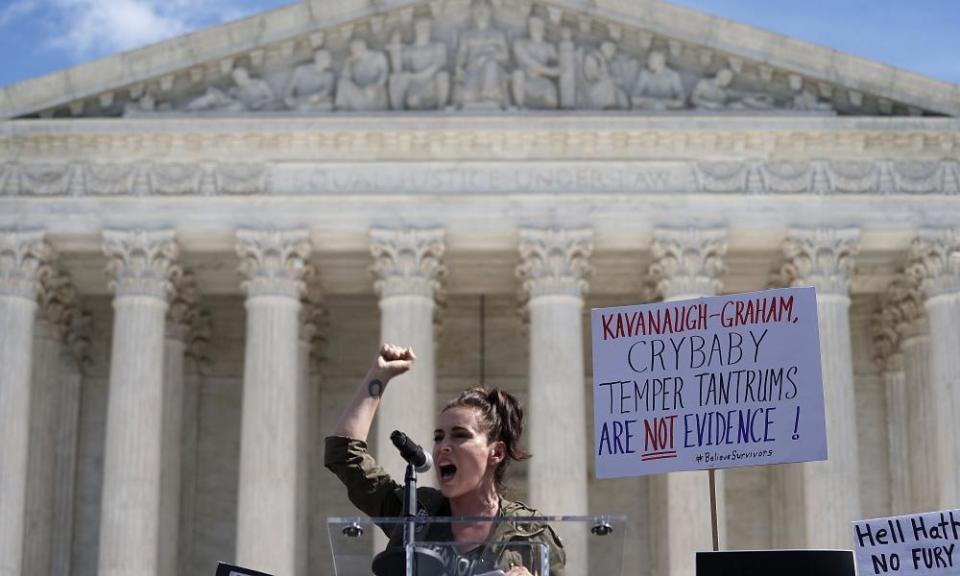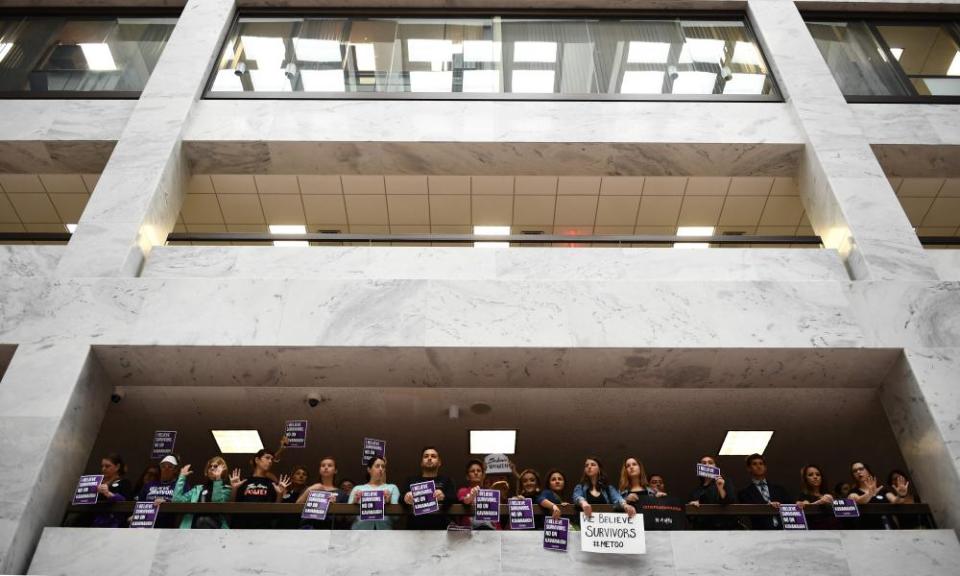'Women are watching': Kavanaugh hearing focuses activists' anger
Supreme court drama has brought survivors of sexual assault and political organizers together. The next target is the midterms

The #MeToo movement has landed on the doorstep of one of the most venerated American institutions, the supreme court. In doing so, it has given women even more fuel for the fight.
On Thursday, in offices, bars and classrooms, Americans paused to watch Dr Christine Blasey Ford describe an alleged attempted rape to a Senate committee of 17 men and four women. They watched the man who denies the allegation, Brett Kavanaugh, respond with bristling anger.
For survivors of sexual assault and women’s activists, the hearing was another reminder that men who might have been violent towards women should not be allowed to define narratives, shape institutions and dictate standards.
On the line is one of the nine seats on the supreme court, an institution that decides landmark cases such as one that made school segregation illegal and another that made same-sex marriage legal.
There was the women’s march, there was #MeToo, and I think everything is going to come together
Tatiana Perkins
“I think there’s going to be a movement around this and I think it will be even bigger than anything that’s happened before,” Tatiana Perkins, who was raped by a family member when she was eight, told the Guardian.
“There was the women’s march, there was #MeToo, and I think everything is going to come together and it’s going to make some waves.”
Perkins only caught glimpses of the hearing because she spent the day marching in Washington DC, in protest against Kavanaugh’s nomination. Reflecting on Ford’s testimony later that night, she said, left her feeling numb about her own experience.
“I felt sad for every other survivor that’s gone through this because I can’t care about myself anymore,” Perkins said.
Perkins campaigns for the women’s health group Planned Parenthood, which she said provided a safe place to disclose her assault after she had kept silent for more than 10 years.
If Kavanaugh is confirmed, as is expected despite the announcement of a new FBI investigation, Perkins expects she will finally break down and cry, having held it together through the traumatic cycle of the nomination. That release, she said, will be met with a plan for what’s next.
“I don’t think him being voted in is the end,” Perkins said. “It’s the beginning.”
She was far from alone. Sam Stein, a reporter for the Daily Beast, said he passed a group of women in the Senate building on Friday who sat in a circle on a concrete floor and shared stories of being abused and raped.
“I have literally told no one else this story,” one said, “before I talked to you all.”

On the day of the hearing, two groups that fight for the rights of sexual assault victims – Planned Parenthood and the Rape, Abuse & Incest National Network (Rainn) – saw sharp increases in traffic on their websites. Calls to Rainn’s national abuse hotline jumped by 201%. A spokesperson for the Planned Parenthood Action Fund (PPAF) said its campaign site saw more traffic on Thursday than it had all year.
“Millions of women and countless survivors were watching today,” the PPAF tweeted, “and they saw a Senate majority that has abandoned them.”
‘We are ready to fight’
Since the supreme court formed in 1790, there have been 113 justices. A grand total of six were not white men. Because they are appointed by a president, justices’ judicial records tend to support the goals of that president.
At the moment, four justices lean conservative and four lean liberal. The ninth was Anthony Kennedy, a conservative considered a “swing vote” because he voted with the liberals in some major cases.
But Kennedy decided to retire, giving Donald Trump a chance to tilt the court in favor of a conservative agenda that could include an attempt to overturn Roe v Wade, the 1973 ruling that guarantees abortion rights. In an earlier Senate hearing, Kavanaugh was asked if he would make a commitment against overturning the law. He declined to respond.
We have been forced to watch once again as a woman recounts her trauma for public consumption
Fatima Goss Graves, National Women's Law Center
With that case on the line, and the person who could deliver its death knell accused of sexual assault, it was no wonder eyes were glued to televisions on Thursday.
Preliminary viewership reports show that from 11am to 6.45pm on Thursday, nearly 20% of US households with televisions were watching the hearing at any given time, according to Nielsen analysts. CBS News and CNN said it was their biggest day of the year for digital video views. More than 10 million people pressed play on CNN’s apps, website, Facebook streaming service and YouTube channel.
That attention paralleled the 1991 confirmation hearings for justice Clarence Thomas, in which attorney Anita Hill testified after accusing Thomas of sexual harassment.
“We have been forced to watch once again as a woman recounts her trauma for public consumption,” said Fatima Goss Graves, president and CEO of the National Women’s Law Center, “as the majority of the committee rallied around Brett Kavanaugh.”
But all was not lost, Goss Graves said, because “women are watching – and we are ready to fight”.
The outlines of that fight took shape as women filled the halls of Congress, protesting against Kavanaugh. The organizers of the women’s march, whose January 2017 protest was probably the largest single-day demonstration in US history, said on Friday afternoon they would soon release details on a new march.
They also hung three banners declaring opposition to Kavanaugh’s nomination in the atrium of the Senate office building. In bright pink letters on a stark black background, one banner carried the same message as chants in the halls of Congress: “November is coming.”
It was a piercing reminder to politicians that the midterm elections are expected to set a record for female victories and inspire armies of energized female voters. At least one Republican senator seemed to respond.
As members of the judiciary committee prepared to vote to send Kavanaugh’s nomination to the full chamber, Jeff Flake of Arizona said he would not vote yes unless an FBI investigation was conducted in the next week. The White House then ordered it.
Earlier that morning, Flake had endorsed Kavanaugh. Between his endorsement and his call for FBI involvement, networks showed live footage of the senator being confronted by a protestor, Maria Gallagher, in an elevator.
Gallagher identified herself as a rape survivor and told Flake: “I didn’t tell anyone and you’re telling all women that they don’t matter, that they should just stay quiet because if they tell you what happened to them, you are going to ignore them.”
Asked about the encounter, Flake said: “It has been remarkable over the past week the number of people who saw Dr Ford yesterday who were emboldened to come out and say what had happened to them.
“I’ve heard from friends – close friends – and I had no idea.”

